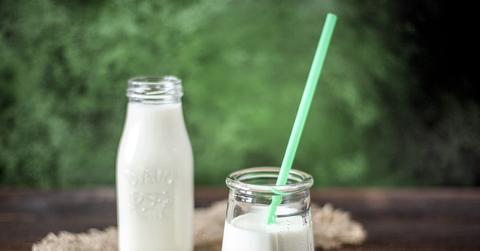United Kingdom Sees Increase In Glass Milk Bottle Sales
A large amount of milk distributors in the United Kingdom are seeing an increase in glass bottle sales in the first part of 2018. The trend is likely due to rising awareness in plastic waste, and carbon emissions are decreased if companies follow the right procedures.
Updated Nov. 19 2020, 9:38 p.m. ET
People are making the switch from plastic to glass milk bottles in the United Kingdom. The majority of dairy business have reported a rise in sales, including going back to the traditional method of delivering glass bottles to customers’ doorsteps. It’s a trend that’s surged in the first part of 2018 as people are limiting their plastic use.
Since the 1990s, milk delivery services have seen a continuous decline. According to DairyUK, the latest delivery figures are one million milk pints per day, which is approximately three percent of all milk sales. That includes both glass and plastic deliveries as that figure is mixed together.
Of the 20 milk-distributing businesses that got in touch with the BBC, 85 percent of them have seen an increase in glass bottle sales. There’s been a seven percent rise with Thomsons and Pensworth since January, and a 10 percent jump with Acorn and Brecon Milk. Milk & More, the biggest company on the list, revealed that 90 percent of their over 15,000 new customers from the beginning of the year.
Paul Lough, who is the manager of Parker Dairies, told The Evening Standard that of their 382 new customers from the beginning of the year, 95 percent of them wanted glass bottles. They now receive “30 calls a week” when they had an average of 30 calls per month before the new year.
When the uptick began, milkman Stuart Bruckner told The Guardian in February that the popular documentary, Blue Planet II, sparked the trend: “Interestingly, it’s a younger demographic of customers calling up. More families and couples in their 30s and 40s are putting orders in specifically for milk in glass.”
Glass milk bottles are certainly trending upward, but not all companies and distributors are fully jumping on board. They’re more expensive to purchase than the plastic alternatives, and their benefits could be mixed. Pricier manufacturing costs are passed to the consumer, and glass bottles can easily be destroyed in shipment.
WRAP (Waste & Resources Action Programme) tells the BBC that a glass bottle would have “to be reused at least 20 times” to neutralize its carbon emissions. However, there’s a lot more potential for them to be recycled. Lanchester Dairies have some bottles “are up to two or three years old” and are used up to 60 times.
Glass bottle distribution is an interesting rising trend that, in practice, is better for the environment. For customers that can afford it and local delivery companies that reuse bottles frequently and hold their suppliers to similar standards, it’s a viable option. They’re also a better way to consume milk with no plastic chemicals and glass bottles can be fully sanitized.

